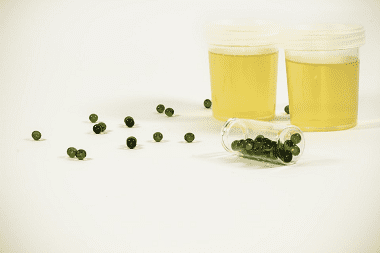Health for a lifetime >>>> Protein in urine - what to do?
Protein in urine - what to do?

Protein is the main structural material of the body: it is present in all organs and tissues, performs many functions. But where the protein shouldn't be is in the urine. Where does urine protein come from?
In the body, protein plays a very important role - it maintains oncotic pressure (part of the osmotic pressure that regulates the transfer of fluid from the capillaries to the intercellular space and back to the bloodstream). The proteins albumin and globulins are involved in maintaining the oncotic pressure at the proper level. If the oncotic pressure is lower than the pressure in the bloodstream, then the fluid fills the interstitial space and causes tissue edema.
If the kidneys do not work properly (damage to the kidney filters - the renal glomeruli), the albumin protein goes beyond the filter and enters the urine. In a healthy body, only a small amount of albumin is allowed in the urine, but when its amount in the urine exceeds the daily dose of 300 mg, it means that there is a renal pathology.
In addition to impaired renal function, high protein in the urine can be caused by an infectious disease of the genitourinary system.
The medical name for pathology (the presence of protein in the urine) is proteinuria. Although proteinuria can result from various disorders, approaches to the treatment of high protein content in urine boil down to two possibilities: elimination of the underlying disease that provoked proteinuria or the mechanism of its occurrence.
Treatment of protein in the urine may be aimed at eliminating the infection that caused proteinuria, and then antibiotics are indicated. The development of the inflammatory process that caused proteinuria can be stopped by the use of corticosteroids, antiplatelet agents and cytostatics. Some act on the focus of inflammation, others - on the quality indicators of blood, while others prevent cell proliferation (division), reduce the autoaggression of B-lymphocytes and T-lymphocytes involved in the immune response.
If you find an increased protein content in the urine, you should not choose the treatment yourself, as it is necessary to clarify the mechanism of development of the disease and identify the infection, if any, in the body.

Read

Read



























